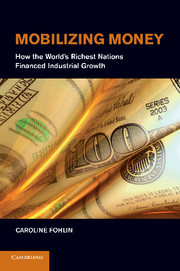4 - Governing Corporations
Published online by Cambridge University Press: 05 January 2012
Summary
Formal relationship building with nonfinancial firms constitutes a hallmark of the canonical universal banking system and a fundamental point of divergence between those systems and that of the Anglo-American, arms-length type. Relationship banking relates to those bank activities that cede to them at least partial control over the decisions and actions of their client firms. In theory, corporate ownership and governance relationships between banks and firms discipline banks and firms to behave in each other’s long-term interest. Thus, relationship banking is seen as integral to the operations of universal banks, even though the two characteristics are theoretically and empirically distinct from one another. In most cases, formalized relationship banking combines one or more of three practices: bank-held equity stakes in firms, proxy voting of bank customers’ stakes in firms, and representation in the supervisory boards of firms.
Equity Stakes and Proxy-Voting Rights
One of the most prevalent notions in the literature on relationship banking is the significant use of bank equity stakes in nonfinancial firms and the resulting influence these holdings yield over firms’ decisions. Long-term holdings of equities – anything held over the close of an accounting year – will appear in the balance sheets of the banks if they are owned directly by the bank. The size and variety of such holdings offers one way to assess their importance relative to the other activities of the banks. Naturally, we have to contend with reporting problems, and these could vary across countries. Although many reporting laws were weak and vague in the pre–World War I era, banks did book securities holdings if they existed. Using aggregate statistics helps smooth out what is likely to be primarily bank-level variance in practice.
- Type
- Chapter
- Information
- Mobilizing MoneyHow the World's Richest Nations Financed Industrial Growth, pp. 84 - 111Publisher: Cambridge University PressPrint publication year: 2011



